The Belarusian dictator Alexander Lukashenko has won a seventh term in office in a farcical election condemned by the European Union and oppositions figures.
Lukashenko has ruled the former Soviet republic with an iron fist for over 30 years having gained power in 1994.
With many of his opposition either in prison or exiled, the 70-year-old sailed to victory in today’s election winning a staggering 87.6 per cent of the vote, according to exit polls.
However, the election has been condemned as a sham by the European Union due to the lack of independent media in the country and the token opposition candidates who remain loyal to Lukashenko.
Lukashenko said he did not care whether or not the bloc recognised the results.
The vote takes place five years after the turbulent 2020 election which saw Lukashenko’s grip on power almost come loose after millions of citizens flooded the street condemning the result and demanding the president resigns.
In response to months of protests, Lukashenko arrested 65,000 people and forced opposition figures to flee abroad.
This included the de facto leader of Belarus‘ opposition Svetlana Tikhanovskaya who stood against Lukashenko at the time.
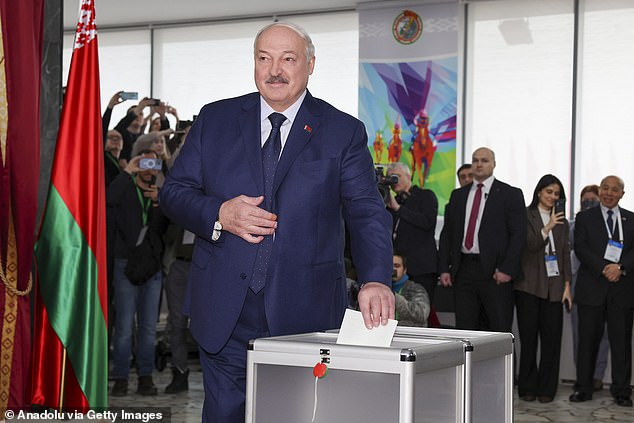
Belarusian president Alexander Lukashenko casting his vote in Sunday’s election. With many of his opposition either in prison or exiled, the 70-year-old sailed to victory in today’s election winning a staggering 87.6 per cent of the vote, according to exit polls
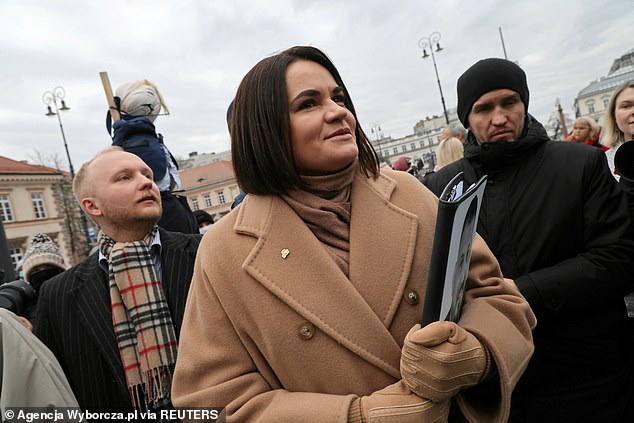
Belarus’ exiled opposition leader SviatlanaTsikhanouskaya in Warsaw. She has condemned today’s election as a ‘farce’

Belarusian diaspora at a protest against Sunday’s election in Warsaw. The election has been condemned as a sham by the European Union due to the lack of independent media in the country and the token opposition candidates who remain loyal to Lukashenko
She has condemned today’s election as a ‘farce’.
Europe’s so-called ‘last dictator’ has only tightened his grip on power since 2020 and as a key ally of Russia in its invasion of Ukraine the country is now more isolated, and reliant on Putin, than ever before.
Fearing a repeat of 2020, the election has been tightly orchestrated taking place in January rather than in summer to deter protesters.
‘The trauma of the 2020 protests was so deep that Lukashenko this time decided not to take risks and opted for the most reliable option when balloting looks more like a special operation to retain power than an election,’ Belarusian political analyst Valery Karbalevich said.
On top of this Lukashenko has jailed more than 1,200 political prisoners therefore destroying what little opposition remained in the country.
During a four hours and 25 minutes press conference today, the autocrat said his opponents were behind bars or abroad out of choice.
‘Some chose prison, some exile,’ he said.
‘If it is prison then it’s those who opened their mouths too widely,’ he added.
Repenting and asking for pardon were preconditions for any prisoner releases, he said.
In Warsaw, home to many exiled Belarusians who have took to the streets today to protest the dictator, Tikhanovskaya described Lukashenko as a ‘criminal who has seized power’.
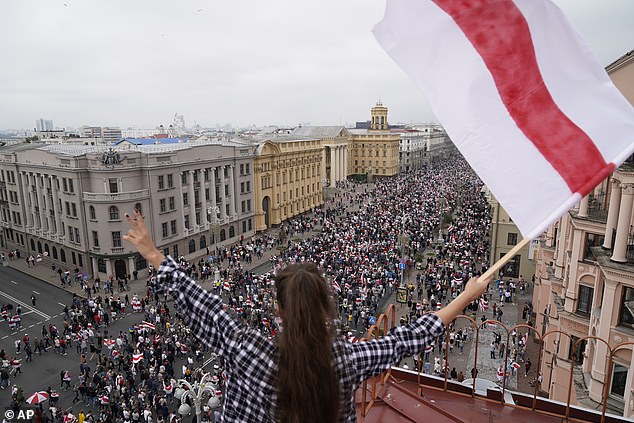
The vote takes place five years after the turbulent 2020 election which saw Lukashenko’s grip on power almost come loose after millions of citizens flooded the street condemning the result and demanding the president resigns
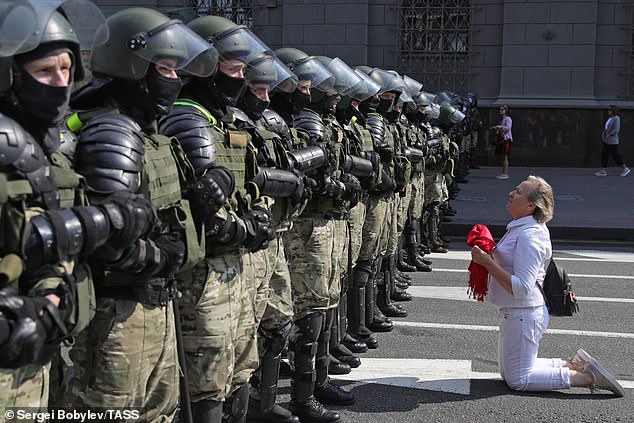
A Belarusian opposition supporter kneels in front of riot police in 2020. In response to months of protests, Lukashenko arrested 65,000 people and forced opposition figures to flee abroad

Tikhanovskaya (centre) told AFP in an interview earlier this month she wanted dissidents to be ready for an opportunity for change in Belarus. But she admitted that it was ‘not the moment’
Many fellow opposition figures wore masks and refused to speak to reporters, out of fear of potential repercussions for their relatives in Belarus.
‘It’s just a country with the illusion of choice,’ 22-year-old student Aliaxandra said, adding that some of her countrymen had been living in fear ‘for decades’.
Tikhanovskaya told AFP in an interview earlier this month she wanted dissidents to be ready for an opportunity for change in Belarus. But she admitted that it was ‘not the moment’.
The United Nations estimate over 300,000 Belarusians now live abroad but they are unable to have a say in the governance of their home country after Lukashenko scrapped overseas voting.
For everyday Belarusians, life before Lukashenko is a distant memory after the leader seized power in the country’s one and only democratic elections.
Since then the country has retained much of the Soviet Union’s traditions and infrastructure including state-ownership of many key industries.
The country has also remained staunchly loyal to Russia since it gained independence in 1991 from the Soviet Union.
In 2022, Lukashenko – who is largely regarded a stooge to his Russian counterpart Vladimir Putin – allowed Russian forces to invade Ukraine through Belarus.
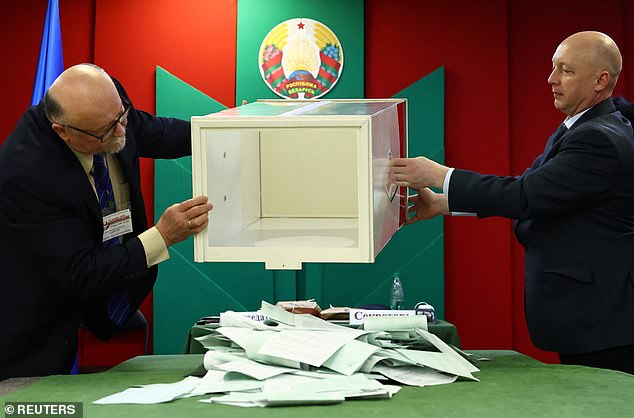
Ballots being counted in the Belarusian election. Fearing a repeat of 2020, the election has been tightly orchestrated taking place in January rather than in summer to deter protesters
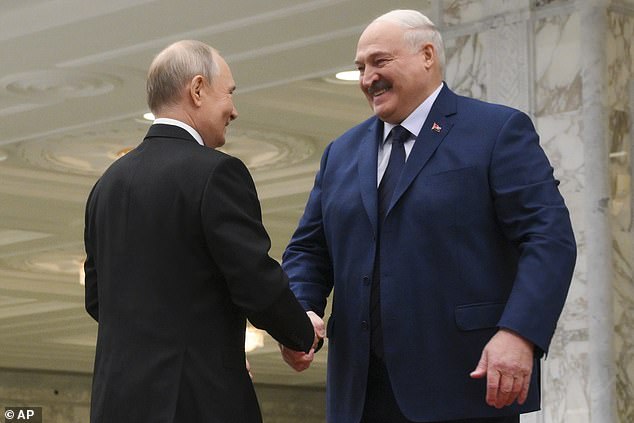
Vladimir Putin and Lukashenko shake hands. The country has remained staunchly loyal to Russia since it gained independence in 1991 from the Soviet Union
The leader also recently announced that Russian Oreshnik hypersonic missiles will be deployed in the country shortly ahead of Putin’s own forces.
Lukashenko has boasted about being supplied with Oreshnik by ‘my elder brother’ Putin, 72.
The election comes after a number of turbulent elections in fellow former Soviet republics.
In Moldova, the country’s incumbent pro-EU president Maia Sandu won re-election in a vote marred by marred by alleged election meddling by the Kremlin in an apparent attempt to skew the vote towards Ms Sandu’s more Putin-friendly opponent.
Meanwhile Georgia has seen widespread and ongoing protests since the country’s disputed elections in October.
A pro-Putin billionaire oligarch claimed victory in the vote which appeared to single Georgia was moving away from the West and close to Russia once again.
After the election there were reports of government supporters stuffing ballots, beating up election monitors and buying votes.
The country is also facing an ongoing constitutional dispute over who holds the presidency with the pro-European incumbent Salomé Zourabichvili refusing to step down in favour of the more Russian friendly Mikheil Kavelashvili.
The European Union has called for Georgia to hold fresh elections to resolve the crisis.